‘If Joomla! is Linux, then WordPress is Mac OS X. WordPress might offer only 90% of the features of Joomla!, but in most cases WordPress is both easier to use and faster to get up and running.’
Over the course of the last few years, I’ve been in charge of putting up a number of websites for various companies, often as favors for friends. In most cases, I’ve ended up using one out of two solutions: Joomla! and WordPress. While both of these projects have evolved greatly over the last few years, they are vastly different. Joomla! has always been intended as a ‘fit-all-your-possible-needs’-kind of CMS solution, while WordPress was developed as a blog with CMS capabilities. Recently WordPress has opened up to allow its users to set up a site with static-only material (with the option of a blog-page), without having to hack the code. Hence it’s one step closer to being a direct competitor to Joomla!.
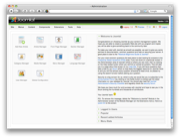 |
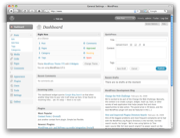 |
I will probably step on a few peoples feelings here, but I will argue that Joomla! is an example of a poorly managed open source project and that WordPress is a very successfully managed one. Certainly I don’t mean that Joomla! is a useless piece of junk, but that the lead developers have quite a bit to learn from WordPress. The main thing that Joomla! is vastly behind on is usability. While it is true that Joomla! 1.5 is a step in the right direction, it is still light years behind WordPress. Let me illustrate with two examples of common tasks.
Example 1: Create a blog-post with an image
Joomla!
- From the ‘Control Panel,’ click ‘Add New Article.’
- There are two image buttons. If you use the wrong one, you won’t be able to upload an image (as you will only browse the existing images). You must use the one below the text field.
- Select a ‘Title,’ the right ‘Section’, and then the right ‘Category.’
- Write the content and save.
WordPress
- Select QuickPress in the Dashboard.
- Click on the image icon and upload the image.
- Select title, write your content and press publish.
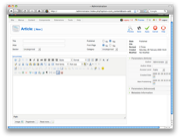 |
 |
Example 2: Create a static page accessible from the menu
Joomla!
- From the ‘Control Panel,’ click ‘Add New Article.’
- Select a ‘Title,’ the right ‘Section’, and then the right ‘Category.’
- Write the content and save it.
- From the top-menu, select ‘Menu’ and ‘Main Menu’ (assuming you want to add it to the main menu.)
- Click ‘New.’
- Select ‘Internal link,’ and ‘Articles,’ and then finally ‘Article Layout.’
- Fill in the title of the object as well as the parent item.
- In the column to the right, you now need to browse your list of articles and select the desired article.
- Press ‘Save.’
WordPress
- From the Dashboard, click ‘Pages.’
- Select ‘Add New.’
- Fill in the title and contents.
- Select the parent item (if other than root.)
- Click ‘Publish.’
 |
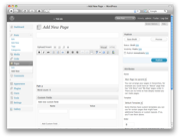 |
Let’s step back for a minute and imagine the following scenario: you’re in charge of putting up a website for a company. They might want to put up about 10 or so pages with various information. According to my experience this is a pretty common situation. You can do this with either Joomla! or WordPress – both are fully capable of delivering this. Assuming you’re going to buy a template to solve the design issue, it will probably take you about an hour with either of the software to get to the first draft (assuming you’ve been working with them in the past.) So far so good. This is where they start to differ. With WordPress you’re pretty much done by now. However, with Joomla!, you’ll probably have to spend another hour or two just trying to re-organize the different modules to fit the template you bought (in many cases, just to get the basics to work.) Next you will end up spending even more time trying to figure out how to re-organize the different menus. You need to link up a particular document to a particular menu-entry (as illustrated above.) If you want a blog-feed, you need to set up a dedicated section or category (I still don’t really know the difference between the two.) Moreover, you need to select the ‘style’ of blog you want.
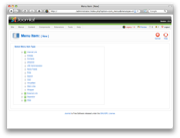 |
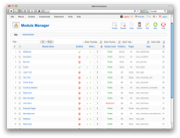 |
in Joomla! |
Let’s say you managed to figure all of that out and that you got the site ready. Now it’s time to hand over the site to the customer. There will obviously be some training involved, and here’s another crucial difference between Joomla! and WordPress. Training someone to learn WordPress takes (in my experience) less than 30 minutes, and they truly understand it. Training someone to use Joomla! takes at least an hour, and they still don’t really understand it.
Again, I’m not saying that Joomla! is useless, it’s that WordPress is a more intuitive piece of software. Let me throw an analogy out there that will probably help you better understand my point. If Joomla! is Linux, then WordPress is Mac OS X. WordPress might offer only 90% of the features of Joomla!, but in most cases WordPress is both easier to use and faster to get up and running. I use and love Linux, it just doesn’t have that elegant touch to Mac OS X does.
To Joomla!’s defense, there are at least two scenarios I can think of where Joomla! is a better fit than WordPress. The first one would be eCommerce. If you install VirtueMart on Joomla! you can be up running with an eCommerce site pretty quickly. However, the problem is that it does not feel like it is a part of Joomla!, but rather as a 3rd party module that works in Joomla! (which is pretty much what it is.) The second one would be a site where you need to have multiple levels of permissions (ie. an extranet). WordPress only offers three levels of permission (public, private, and password protected), while Joomla! is much more flexible.
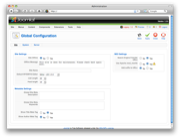 |
 |
in Joomla! |
in WordPress |
Joomla! is not doomed. It just has a long way to go when it comes to usability. WordPress has really been developed by the KISS-principle, while Joomla! appears to have been developed to solve every problem on Earth (by engineers, for engineers). Going back to the two problems I mentioned above, where Joomla! beats WordPress. I think it would actually be less of a challenge to add support for eCommerce and more permission levels to WordPress, than it would be to improve the usability in Joomla! to reach WordPress’ level.
Just as a side note, a quick line-count on the latest versions of both software reveals that Joomla 1.5.9 has 350,975 lines of codes, while WordPress 2.7.1 has a mere 159,682 (might not be completely accurate, but that’s what ‘wc -l’ said). Hence, even if WordPress only offers 70% of the features of Joomla!, which I am pretty sure it does, their code is written much more efficiently.
Author: Viktor Petersson Tags: internet, Joomla, open source, usability, WordPress

I am a programmer and have messed with both Joomla! and WordPress and static web page development.
I tried with several Joomla! books because it looked very capable, which I believe it is.
However, in the parlance of trying to explain recursion, I have decided that:-
“To Understand Joomla!, First You Must Understand Joomla!”
What a pity.
I like the Windows UIs. I don’t like Gnome or KDE much. I find OS X pretty but hard to use and not really intuitive–mainly because it is so much like the Linux UIs! So I don’t really feel your analogy.
Yes the WP UI is now superb. Better than Joomla’s, sure. I would not say that means J! is vastly behind on usability. Drupal is.
The main thing you are in the dark about is that there are a ton of application add-ons and integrations for Joomla that WP can’t match. It’s not just eCommerce, it’s CRM, project management, venue/events and registration management, calendaring… You can now integrate Joomla with Magento and Alfresco.
Joomla by itself as a web application framework is not very comparable with WP, which is a pure CMS, which is to say, a very mature blog. Want to go to WP hell? Integrate a forum and other stuff that requires custom user profiles and access permissioning. Joomla has long been able to do this, though with a good deal of time and trouble involved due to the limitations of its core ACL and content component through Joomla 1.5. This is poised to change, and I will agree that the fact that it has taken so long is suggestive of a “poorly managed project.” It may be more correct that it is very hard to manage the project when a lot of development is done by 3PDs who don’t get involved in the core development.
But Joomla is getting better on these points and seems poised to emerge as a webdev platform for sites that are content-heavy or application intensive, or some of both. WP is not in this league.
With WP you are limited to fairly basic features, and if you go crazy with plugins and integration schemes, a world of pain and sub-optimal performance awaits you.
A lot of people who know how to use one tool–whether it’s Joomla, Drupal, WP or something else–think that because that tool can be made to do (or approximate) a given task, it is therefore the best tool to use. When this is done on a commercial basis, it is unethical and foolhardy. Would you rather take your $10k budget and talk to a window replacement contractor who only installs one brand of window, or would you like to talk to a contractor who works with 5 brands and will show you comparative features and price differences for all 5?
I think it would do a lot of good if written contributions to FOSS CMS rivaries indicated to extent of the authors’ experience with the systems in question.
I would have liked to have seen Drupal here. I don’t think you can talk about these two without considering Drupal. Drupal was voted the best CMS solution by Packt publishing. For other readers of this thread, consider checking out Drupal. It’s got its usability problems, but its so much more powerful than the other tools. The community is hopeful to arrive at a more usable solution in 09. Also, Drupal is the only CMS that is commercially supported. That means you can build sites, or products with Drupal, and distrubute them as a backed, supported product/service. A one of a kind offering.
I agree with other posters here: Joomla and WordPress are in different categories, so why compare the two? WP offers half the functionality, but it is not intended to be a CMS. So, it really depends on what your purpose is. The two main CMS applications out there are Joomla and Drupal.
Some time ago, I tried to setup a site using Drupal. However, I decided to switch to Joomla (that was in the days of 1.0.x; now, I’m using 1.5.x, so things may be different). I’ve heard many times that it’s easier to develop in Drupal. It was made by engineers, for engineers. That would be a good thing because customizing the Joomla install is a really big pain.
However, there is one thing that Drupal users fail to understand that Joomla users get, and the “mystery” reason Joomla has a larger user base: the very business need that a content management system is trying to meet. A CMS is not intended to be a framework for developers, but a tool for the *end users/customer* to manage their own Website without the help of a developer. To that end, Joomla has the more user-friendly administrative interfaces. To add to that, Joomla makes it easier for developers to build custom site templates. We can talk about extending the application, but that’s rarely considered as an initial priority when setting up a Website.
Now, if the Joomla developers made it easier to customize and extend the application, then they would break from the competition. On the flip side, if the Drupal developers made their administrative interfaces more user-friendly and the template easier to customize, the same would also apply.
What’s important to remember, and should always be the bottom line, is what is important to your customer.
Wow, great discussion and great comments. The comparison is actually appropriate as both systems seem to be the most popular CMSs around these days. If you want to see a comparison of their features you can go to http://www.cmsmatrix.org, and select the two there. Actually, you can compare almost any CMS in that website.
I tried them both systems, together with Drupal and others, and Joomla beat them extensively. To summarize it: if you want just a blog, go with WP; if you want something else: dont loose your time and go with Joomla. The key is in the code behind. While WP’s code is basically a script (and a good one); Joomla uses the most recommended patterns for applications; i.e.: object-oriented and MVC. For designers this probably doesnt mean much; but for programmers it is a BIIG deal. Therefore, Joomla’s framework will make developing way easier because I can inherit the methods from the core classes in the framework. That feature is very limited in WP, in which inheritance is not per se implemented; although you can of course use the variables and outputs from the core functions, but that is very different.
For designers, guys (and girls) try Joomla template system and then talk to me again. Basically, with Joomla your template is just one page; that’s it. Obviously, if you want to create complex sites you can have more than just one; but the basic layout is set in just one page. I tried WP once and it was hard to visualize the layout because it was broken down into different files, right?
I know this post doesnt add much, and no one will probably read it since it will be down at the bottom of the article. But I felt I had to say something about these eternal battles. Although the comparison is legitimate; we all know you just wanted to create traffic to your site by attracting us dummy geeks. Good one! Maybe I’ll initiate a debate like this in my site, let me think…, how about: mouse vs. keyboard?
1. Drupal
2. WordPress
2. Joomla (tie)
4. eoe
I don’t have much experience with Joomla, but I do know it is much better than Drupal and some other CMS system. But WordPress really rocks. I made one year ago my own smll php script to host articles and update them, with very few files, but WordPress is much easier than anything. To update things online, I am using WordPress’s page feature to put some pages and blogging to update news, information about company. I love wordpress.
“If Joomla! is Linux, then WordPress is Mac OS X”
Good analogy.
I am Joomla user and so far I am happy with what Joomla has.
Don’t forget that Joomla was just born on 2005, 2 years younger than WordPress.
And you can see that J1.5 has a good API, therefore many developers like to make extension for Joomla
The company I work for has been working in Joomla for some time now. When I joined the team, I started pushing for WordPress, and here is why:
1. WordPress allows you to use a PAGE as your home page and not the blog page.
2. Using CSS, you can customize your home page using multiple “Sidebars”, which can be made to work either either vertically or horizontally, thereby being able to insert any widget into a sidebar to develop a layout that looks like a static home page, but pulls content dynamically.
3. I find publishing in WordPress much easier than Joomla! I abhor the menu structure of Joomla! That is my personal preference. It is just not intuitive. I love the fact that when I go to WordPress, I write my content first BEFORE I decide what category to publish too. I can create categories on the fly without having to duplicate the category creation like I do in Joomla! In Joomla!, if I’m not mistaken, you have to create a new category in the category section, then define what type of page that category is going to need and a host of other decisions. With WordPress, you write and select your category, then post. That’s it.
4. Theme designers like WPRemix.com are creating incredibly powerful themes using all the new elements of WordPress that get your site looking more like a magazine, by using the WordPress templates functionality. Having seen hundreds of Joomla themes and hundreds of WordPress themes, I like the fact that many theme designers for WordPress are standards compliant XHTML and CSS. And, anyone with a little knowledge can edit either the CSS or the php files by accessing them through the WordPress admin, in the Appearance settings, to make minor customizations without having to pull down the page and edit in BBEDit or Dreamweaver.
5. WordPress Plugins: When you think about it, what plugins do you need? I need a sitemap, seo, podcasting, embedding video links from viral networks, captcha, spam, polls, recent comments, related comments, sharethis, registration, print this page, and the list goes on. Everything I’ve needed to do so far, has been avail as a plugin. All the plugins I’m using are generally well supported by their developers.
6. WordPress native media library: I love the WordPress media library, because it includes SEO options for images, like title and description. You can resize images in a post by dragging from the corner, or you can click once on the image and open up the media gallery lightbox to change the image size based on percentages.
7. I’ve noticed that when people talk about usability in regards to Joomla! over WordPress, the conversation generally talks about how Joomla! is better on the front end. We must keep in mind–and this is why WordPress rocks–is that anyone using the admin must be able to publish quickly and efficiently as fast as possible, without barriers. With Joomla!, I have to find my category and then add content. With WordPress, I add my content and then select my category. That in itself, is the main reason I use WordPress.
For someone who publishes constantly, I want ease of use, whether or not Joomla! does some things better. I can manage my WordPress site much easier than I can a Joomla! site. With the new plugins uploader, search and install in seconds. With the new templates engine, I can change my blog home page to whatever I want, without having to go through hoops.
8. NYTimes invested in WordPress. Of course, the NYTimes does not run it’s main site on WordPress, but it does run all it’s blogs on WordPress. That, to me, is a huge source of stability. If I’m the NYTimes, I’m going to make sure that WordPress can do all the things I need it to do.
9. SEO is important. I’ve been reading up on Joomla! Drupal and WordPress SEO. One post says that Google looks at WordPress as a blog and Joomla and Drupal as web site installations. It expects WordPress to updated more frequently, so if it’s not, it doesn’t treat WordPress the same way at Joomla! or Drupal. So, that is a disadvantage. If you’re running your site on WordPress and you aren’t updating constantly, then you may fall in your rankings a bit, not by much, but enough that you should be concerned and look into it.
9. Lastly, you know…I’m not even really sure what’s better. All these systems are so complex and there are so many plugins for each now, that it’s almost impossible to say which one is the perfect system for you. What I go on is usability. When I first looked at Drupal, I had no clue as to how to get started. It was very high learning curve. When I used Joomla!, I thought, “this is cool” but then it became to much work. WordPress, for me only, has been an incredible asset, but I’m a blogger and not publishing a magazine or content driven site, so WordPress is right for me in that regard.
I just think that if Joomla! revised their solution so that you write first, then publish, instead of finding your category page first, then writing and then publishing…it would be so much better for someone like myself.
After reading the article and all the posts, I still can’t make up my mind on which application to use. I already installed Joomla and have it up and running. My clients do find it a little difficult to navigate and understand the administration pages.
I am looking for an easier solution that I can pass on to my clients so I do not get bombarded with tons of calls after i leave. Don’t get me wrong, i don’t mind answering questions or supporting a product I helped publish, it’s just these questions could have been answered by doing a simple Google search.
I am going to try a little experiment by installing both Joomla and WP. In this test, I will compile the same site, content, and possibly skin (CSS) on both and see which is easiest for the client.
I would like to thank everyone for their input and comments. It was a great read.
Thank you,
RJ
I suppose whenever theres fanboys theres always going to be the argumentation, the problem stems from the fact that as humans we have to consciously or subconsciously PROVE to ourselves or others that OUR CHOICE is the correct one. So when people say pc is better than mac or vice versa, they arent really talking about which one is better, but in essence defending their CHOICE. I have used Mac and PC since the OS was booted off a floppy. PCs have some advantages and Macs others, but i so much prefer the time i spend on Mac. USABILITY and SIMPLICITY wigh so much more than a few extra features. ROLMFAO at those who are pointing to the fact that WordPress can be replicated in Joomla, so effing what. My tractor can plough fields but i would much rather drive my Mini. Same goes for WordPress and Joomla. I have used both for years and the writer of this article is spot on. For starters most corporate sites do not need the supposed extras that Joomla offers. Since last year i no longer use Joomla for anything at all and here is why. I have developed websites since 1995, we used to have teams of 30 to make sites. Sites for banks, car manufacturers, you name it we did it all. Now all that time ago, we actually sold websites for over a million dollars, yes you heard right. Nowadays, my semi retarded cousin can build a site for a company in his spare time with WordPress but Joomla is beyond him, in the end the bottom line is cost and time is money. In the time it takes me to set up a Joomla site i can set up 10 WordPress sites, and i will repeat most corporate sites do not need anything that WordPress cannot handle. Another major point that needs to be made is that things change over time, there are still those that think that a wesbsitebuilt with WordPress is nowhere near what they can do programming directly, you guys better get with the program and quickly. I pity those developers who cannot see one simple point, in a few years they will NOT be needed for 90% of web sites, the end user will have tools that will enable him to create his website or his companies website with little or no effort. Defending Joomla because it has some extra features is laughable. And yeah, all you ´programers´ better start learning something else. Those who still think WordPress is only for blogging are in for a huge shock. I love Joomla and i love Drupal and i love WordPress, but right now none of my clients need anything more than WordPress and with it i have much more spare time due to the fact that they dont require as much support. Last month i developed 5 sites with WordPress and 1 with Joomla, and i so wish i could have used WordPress for that one site because i hardly have time to answer all the calls for support, surprisingly not one call from the WordPress guys. Nuff said. Cheers
Interesting article. I’ve used Vignette in my job in the past, so had a look at Joomla then realised that it was probably going to take too much ‘admin time’ just like Vignette did…it’s too clunky for my basic needs so I’m gonna try migrating my blogger blog to wordpress on it’s own domain and leave Joomla for the geeks of the world who have more time on their hands ;-)
Well it is quite simple – why don’t you take the best of both worlds and combine them together?
http://www.corephp.com/wordpress
That is all I have to say. The rest of the site – tells the rest of the story.
The timing of this article is perfect for me as I am now managing a site that is driven by Joomla yet I MAY suggest they move to WP.
There are some KEY factors in making a decision:
1. SEO – how easy is it to write manual title and meta tags in each? I know that Google LOVES WP sites.
2. Ease of upgrade.
3. Ability to extend with plugins.
There are some great non-“bloggy” templates out there for WP and I just found some nice templates for Joomla too.
If anyone can shed some light on my 3 points, I would greatly appreciate it.
Thanks!
The bottom line is follow your heart only you can tell what’s right and best for you. Give Joomla and WP a try then decide which one to go, though all the statements you’ve read here are mostly true for both Joomla and WP listening to it will only tend to confuse your judgements.:D :)
Hi
Thanks you for the post.
That is very interesting.
I’m a fan of Joomla, but I’m kind of newbie ;)
Going to check this out.
I’m always looking for good tips and tricks.
Let me know if you got some more.
Thanks,
Amit
nice, really nice!
So if you need a members only section, photo gallery and/or ecommerce Joomla is better?
I’ll take you a step further: I’ve been working with Joomla for years. After taking a peak at Drupal, I may never build another Joomla site again. I wouldn’t say that Joomla is built by engineers for engineers. I’d say that Joomla is built by non-programmers for non-programmers.
Very Nice comparison.
I have to build an online marketplace similar to ebay and I am not sure which one to use. Can anyone suggest me ? I do not have any budget to buy any extension / plugin but I can develop my own as I know php.
Nice post. We have developed sites for our clients using Joomla and WordPress over the last few years. When our client has a dedicated webmaster or IT staff who can manage a more complex environment, we use Joomla. The IT guys and webmasters appreciate the steeper learning curve and the power of these CMS’s. When we develop a site for a smaller company who will have someone in their marketing department manage the site, we use WordPress. The WordPress users love the ease of use and can’t believe how user friendly WordPress is. For every site we develop using Joomla , we develop 5 sites in WordPress. In the last year or two, WordPress has been our solution for the majority of CMS sites we build.
Paul, to answer your questions:
1) SEO with WordPress is a snap. We use a plugin that allows us to enter custom meta data for each page.
2) WordPress has one click upgrade built right in. Back up your DB, click to upgrade, and within a few minutes you’re running the latest and greatest version.
3) WordPress’s plugins are great for most applications. We use the following free plugins quite a bit: Nextgen gallery, cforms II, Event Calendar, Another WordPress Classifieds Plugin, Custom Branding, and a few others. However, ecommerce with WordPress is pretty janky to say the least.
I think the author underestimates the time needed to train a newbie on either system. As a rule of thumb, we spend 2-4 hours training our clients on WP, and 6-8 training our clients on Joomla.
I have seen such a steep progression of WP in the last 2 years that I believe in the near future, WP will offer many of the additional features contained within Joomla and Drupal, but offer much more user friendly set up and management.
that’s my 2 cents.
I have been using Joomla 1.5 for a couple of years now. It has a steep learning curve to get the hang of all its functions. I started using WordPress because I keep hearing so much about it and it has two features I really like — email articles and ping update services.
Since I have been using it, I have found that Joomla is like a full-sized, multi-acre farm where WordPress is a small home garden that only has one crop and only enough to feed a single family.
Drupal is somewhere in between. It more resembles WordPress in ease of use, but a multi-plant garden.
I recently made the mistake of converting two of my sites over to WP because it is easier to setup, but found out it is very limited. As a single topic blog, WordPress is fantastic. But, for multiple topics and multiple daily updates, it can’t cut the mustard. I would need to install more than a dozen copies of WordPress to mimic just one feature that both Joomla and Drupal have — multiple blogs.
To say that WP has 90% of the features of Joomla is like saying a motorcycle has 90% of what the car has, therefore you can use one in place of a simi!
If a person has need of a personal or single blog updated once or twice daily at the most, WordPress is perfect. It is easy to learn, easy to use and has the best selection of templates I have seen available for free.
If you want your family to share a website and each have a blog, you are better off with Drupal which can integrate and separate them with one engine.
If you need to handle several categories integrated into each other with a single control and gathering point, Joomla is the way to go. And this is what I need. I need a simi to haul my cargo around.
I will be using WP for my customers and friends, but I will be going back to Joomla for my needs.
I hope this is helpful information.
Good luck
Thank you for your sharing information this post is meet exactly what i am looking for.
I will come and visit again to get some new information from your site.
Thanks for this very informative information. I take your side. In business sense, the best principle is KISS and SMART. We could not afford a longer learning curve. If something very simple can achieve what you need, there is really no need for very elaborate tool that is useless at present and in the future.
If what I needed is found on WORDPRESS or could be achieved by one of its plug-ins and is also found in Joomla!’s basic component, I will choose WORDPRESS for its simplicity.
I have helped a couple of friends and clients get their ecommerce and sites live. The best result in both the SE and loading time is always hands up on WordPress. My client’s client does not have time for a beautiful website that takes long to load. I cannot sacrifice that. My clients cannot afford to read more on how to manage their site than working on their content.
This is the experience of my team: For wordpress site to be up and running, it takes and average of 16hrs with a custom theme working perfectly. For joomla, 32hrs is not enough. Hiring someone to do this task would be much.
In the end, it will be more profitable to go WordPress even with complex sites. My programmer once told me, show me a site that you think that could not be done in WP and I will show you one done in WP within 32hrs.
I still think she is right!
A very interesting and informative discussion. I can’t help but note the number of users that have switched from Joomla to WordPress and are happy but not vice versa.
I am a newbie website developer (an experienced programmer by trade) and have tried both Joomla and WP. I must say I am very impressed and excited by WP. Joomla just seemed unintuitive too me.
An important point touched upon by some of the previous comments is Loading time. Joomla just seemed sluggish to me where WP running off the same hosting platform simply loaded faster.
I have also installed Virtuemant under Joomla for ecommerce capability – again clunky and not confidence inspiring. With WP I am looking at MarketTheme – adding a shop to my site. Early days but certainly looks encouraging.
Thanks a lot. I am having this debate with myself. Your info has helped.
Our whole web development team was somewhat mystified by Joomla. We found that modules conflicted with each other and that it was difficult to trace through the code for problems. It was also unintuitive, confusing, and easy to forget how to do even simple things through its interface. Not just the code but the interface felt like tracing spaghetti from one point to another to figure out how anything worked.
WordPress has been a piece of cake in comparison. We converted a major client’s entire website from Joomla to WordPress with excellent results, and even if they asked for more complex functionality in the future that WordPress couldn’t handle well, it would probably be easier to hand-code the add-ons than the wrestle with Joomla’s modules.
(Drupal is the other main CMS we are starting to use for more complex projects, which like Joomla has a steep learning curve at first, but seems much better architected once you get to know it. We also work in jsp-based OpenCMS and a cruddy old asp-based CMS for another client.)
From my perspective as a developer, no CMS has offered much advantage over hand-coding a site in php, asp, jsp etc. unless you just want to throw up a blog (for which WordPress is way easier than Joomla).
There might be some advantage for a very large, very complex site with multiple users with different privileges and levels of experience managing a huge amount of modular, re-usable content, plus community membership, discussions, blogs, news, etc., but most sites really aren’t like that. Such sites tend to be very complex to set up and administer whether you use a CMS or not, and using a CMS capable of that level of complexity tends to bring that complexity along even for simple sites. And you still usually can’t entirely avoid mucking around in php/asp/jsp at some point.
So the justification (for me) for using a CMS usually boils down to it being easy for non-developer end-users to add and modify content, and Joomla didn’t seem particularly successful from that perspective.
At the least I don’t want a CMS to get in my way, making it more confusing and difficult to set up or modify the site’s appearance or functionality, and I felt like Joomla tended to make my life harder rather than easier.